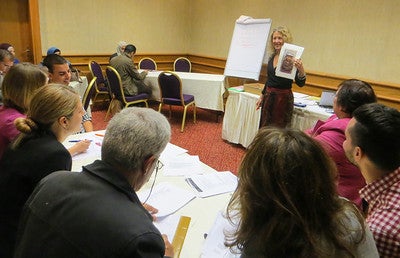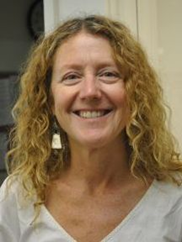“Educators always take on multiple roles, no matter the circumstances — teacher, guidance counselor, nurse, social worker, even lawyer.”
When Ann McAllen accepted a 2014 English Language Specialist assignment in Jordan, focusing on Syrian refugees who had fled civil war in their home country, she was well aware of the issues she would likely confront. Only a few years earlier, she had worked with teachers in Thailand in the border refugee camp of Mae La, where thousands of members of the Karen tribe lived after escaping persecution in Burma. Additionally, in her home state of Washington, she had assisted Vietnamese and Cambodian refugees in the 1990s. And just prior to her Specialist assignment in Jordan, McAllen participated in a workshop that focused on trauma — its impact on both victims and helpers, and how best to mitigate its effects. Plus, she was already a seasoned Specialist and was fully prepared to meet the assignment’s objectives and address participants’ needs.
Still, Jordan proved a unique experience for McAllen. In one teacher training, a daylong workshop at the Middle East Children’s Institute (MECI) in the capital of Amman, she worked exclusively with a group of Syrian refugees — English language teachers in their home country — who were now teaching Syrian children, typically in relocation camps. “The teachers were subdued,” says McAllen. “They just wanted to go home, back to their own country and culture.” At another training, held during the annual American Language Center (ALC) conference, whose theme that year was “Meeting the Social and Psychological Needs of Our Students: The Shifting Roles of Teachers in the Classroom,” the spotlight was on Jordanian English language teachers, whose classes had doubled in size to accommodate the influx of school-age Syrian children. Hence, the title of her conference plenary speech and its related training, “Reflections, Thoughts, and Ideas for Coping with the Stresses of Today’s Classrooms.” As McAllen recalls, “The teachers were so focused on dealing with overcrowded classrooms and mixed-ability students, they felt they weren’t delivering the psychological help needed by the students, particularly the recently uprooted Syrian newcomers.” Yet, both the MECI and ALC trainings had a common denominator — educators in situations of enormous stress.

To tackle the varied needs and concerns of the teachers, McAllen held three workshops at each training: coping with stress in the classroom, understanding different learning styles, and using creative writing in the classroom. For the stress-related workshop, McAllen relied on her knowledge of the impact of trauma. She not only had teachers brainstorm activities they could do with their students, but also those they could use for self-care, such as exercising, playing music, and relaxing over a cup of tea. While the mood was markedly different at the two trainings, McAllen notes that suggestions for managing stress proved universal. “It’s amazing how, no matter where you are in the world, we all have the same ideas for how to handle anxiety.”
McAllen additionally led group discussions with both sets of teachers on recognizing the warning signs of stress among students and implementing coping tools in the classroom, including guided imagery and storytelling. After all, the entire student body, Jordanians and Syrians alike, were dealing not only with classroom change, but also typical stressors such as peer pressure, school demands, and family issues. “Educators always take on multiple roles, no matter the circumstances — teacher, guidance counselor, nurse, social worker, even lawyer,” McAllen says.
“It’s amazing how, no matter where you are in the world, we all have the same ideas for how to handle anxiety.”
In her creative writing training, McAllen wanted to show that relying more on imagination than rules when teaching writing empowers students, even beginning English learners. And in the case of a student population that recently experienced trauma, as with the Syrian refugees, creative writing had an additional benefit — activities such as freewriting, pictures with writing prompts, and bio poems could help them process those experiences. During the creative writing workshop with the Syrian teachers, for example, McAllen, following her teaching model of “doing rather than saying,” had them write poems using a variety of prompts just as they would with their students. What emerged were primarily pieces about their homeland. “It was always at the forefront of their minds,” she says. And the Jordanian teachers at the ALC conference saw how approaching writing instruction in a less structured way could free up their students. “Take away the strict writing regulations, and students gain confidence in their English language abilities,” says McAllen. “Plus, it sparks interest in other kinds of writing.”

Providing teachers with an awareness of different learning styles, another of McAllen’s workshops, also helped. “Teachers have to provide avenues of learning for the various ways students integrate information,” she says. Because of the many ways available to incorporate creative writing in the classroom and the varied exercises McAllen introduced, “the teachers were able to experience learning styles in action.”
While much of McAllen’s assignment in Jordan centered on the educational issues raised by integrating the Syrian refugees, McAllen also had the opportunity to work with other teacher and student populations during her assignment. An English Access Microscholarship Program (Access) teacher training near the Dead Sea brought in Access teachers from across the region, including Israel, Lebanon, and Palestine, and at a creative writing workshop she led with Access students in Wadi Musa, near the archaeological site Petra, students eagerly read their poems “without a hint of shyness,” she recalls.
Still, the Syrian refugees and the Jordanian teachers instructing them hold a special place in McAllen’s recollections of the assignment. “The resilience and optimism I saw in Jordan so impressed me,” she says. “My time there remains one of the most unique experiences I’ve had as an educator.”

Ann McAllen has been working in international education programs since 1988. She has been an ESL/EFL teacher with a broad range of levels in a variety of settings (universities, community colleges, refugee/immigrant programs). Since 1995, she has been involved in developing and implementing teacher-training programs. She has worked with local teachers in many countries in Central Asia, South and South East Asia, as well as in Africa, Eastern Europe and the Middle East. Teacher-training projects include numerous in-country programs with the Peace Corps. Additionally she developed specific Training of Trainer (ToT) courses. For two years in Ukraine she implemented a ToT course in which the trainers are still delivering workshops throughout the country. In Thailand and Vietnam she worked with the ToT Network Training project which has trained 300+ trainers to date.
